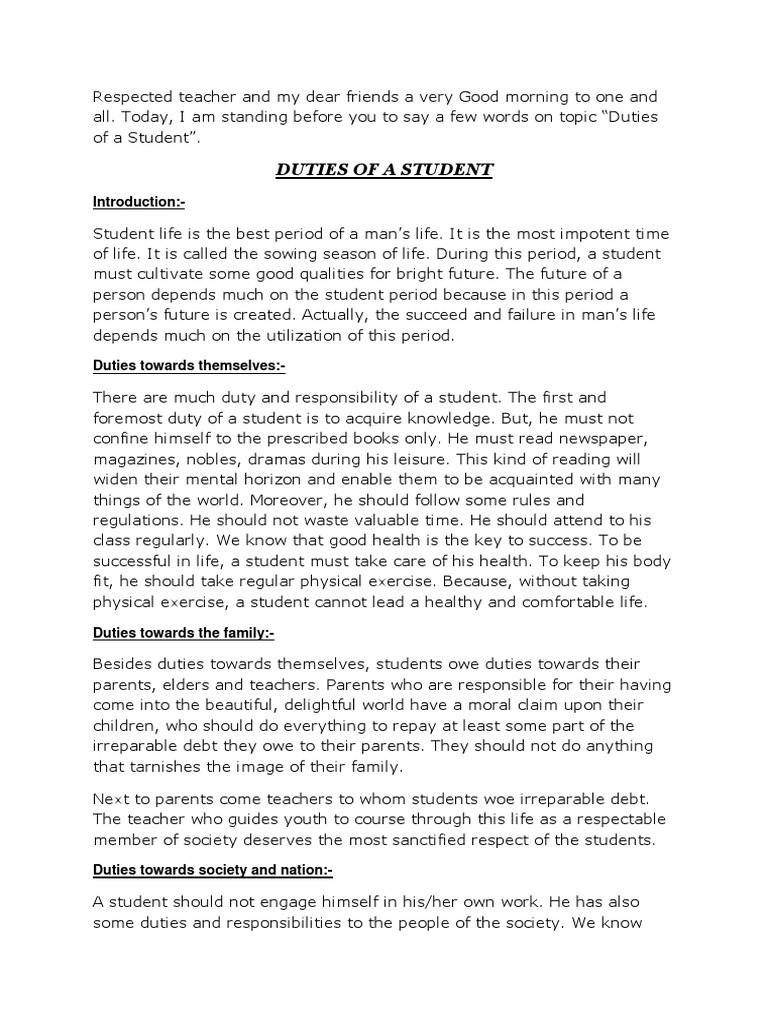As a student, duties include attending classes, studying regularly, managing time effectively, and preparing for exams. These tasks are essential for academic success and personal growth.
Students should also actively participate in extracurricular activities, collaborate with peers, and seek guidance from mentors. By fulfilling these responsibilities, students can develop critical thinking skills, enhance their knowledge, and build a strong foundation for their future endeavors. Taking ownership of their education and engaging wholeheartedly in learning experiences will not only benefit students academically but also help them develop essential life skills.
Embracing these responsibilities as a student will pave the way for a successful and fulfilling educational journey.

Credit: m.youtube.com
Academic Responsibilities
As a student, your academic responsibilities are crucial in your journey towards success.
Attendance And Participation
Regular attendance and active participation in classes are key components of academic success.
Maintaining Academic Honesty
It is essential to uphold academic integrity by avoiding plagiarism and cheating in any form.
Time Management
Time management is crucial for students to balance their academic responsibilities and personal activities effectively.
Balancing Study And Leisure Time
Creating a daily schedule helps students allocate time for studying and enjoying leisure activities.
- Allocate specific hours for studying and relaxation each day.
- Ensure to take short breaks in between study sessions to stay refreshed.
- Include physical activities or hobbies in the schedule for a well-rounded lifestyle.
Meeting Assignment Deadlines
Completing tasks on time is essential to avoid last-minute stress and ensure academic success.
- Break down assignments into smaller tasks and set deadlines for each.
- Use tools like calendars or apps to track assignment due dates.
- Seek help from instructors or classmates in case of difficulty meeting deadlines.
Behavioral Conduct
As a student, exhibiting proper behavioral conduct is paramount for fostering a positive learning environment. Upholding respect for teachers and peers and adhering to school rules and regulations are fundamental aspects that contribute to a harmonious educational community.
Respect For Teachers And Peers
Showing respect to teachers and peers creates a conducive atmosphere for learning and collaboration. This can be achieved through active listening, courteous communication, and consideration for others’ opinions.
Adhering To School Rules And Regulations
Following the school’s rules and regulations is crucial for maintaining discipline and order within the educational institution. Students should familiarize themselves with the guidelines and adhere to them to ensure a safe and respectful environment for all.

Credit: bdlessons.com
Personal Development
In order to become well-rounded individuals, students must not only focus on their academic achievements but also prioritize their personal development. This aspect plays a vital role in shaping their character and preparing them for future challenges and success.
Setting And Achieving Academic Goals
To maximize personal growth, students should set and work towards achieving their academic goals. By consistently setting targets and striving to meet them, students develop a strong sense of discipline, time management, and self-motivation. For example, they may aim to achieve a specific grade in a subject or complete a certain number of assignments each week. This process helps them stay focused, organized, and accountable for their own progress.
Continuous Learning And Improvement
As students engage in continuous learning and improvement, they foster personal development. They should prioritize acquiring knowledge beyond the classroom and actively seek opportunities to expand their horizons. This can involve attending workshops, participating in extracurricular activities, or exploring new subjects of interest. By indulging in these experiences, students not only enhance their academic abilities but also develop essential life skills, such as critical thinking, problem-solving, and teamwork.
Community Engagement
Engaging with the community is a vital role for student composition, fostering connections and contributing to a shared discourse. This involvement allows students to actively participate in societal dialogues and implement impactful change. Through their duties, students cultivate relationships and institute positive transformations within their communities.
Participation In Extracurricular Activities
Engaging in extracurricular activities is an integral part of a student’s community engagement. These activities provide students with opportunities to explore their interests, develop new skills, and interact with their peers outside of the academic setting. Whether it’s joining a sports team, a debate club, a music band, or any other group, participating in extracurricular activities helps students broaden their horizons and enhance their overall development. By immersing themselves in these activities, students not only learn teamwork, discipline, and leadership but also contribute to fostering a vibrant and inclusive school community.Contributing To A Positive School Environment
Maintaining a positive school environment is crucial for creating a conducive learning atmosphere. As student members of the school community, it is essential to actively contribute to this environment in various ways. Holding respect, kindness, and empathy as core values, students can build a positive rapport with their teachers, classmates, and staff. By treating others with courtesy, fairness, and understanding, students help establish a harmonious atmosphere where everyone feels valued and supported. Additionally, making an effort to prevent bullying and discrimination, by promoting inclusivity, encourages a safe and nurturing space for all students to thrive.Ensuring Each Heading Adheres To Html Syntax
It’s important that each subheading adheres to HTML syntax to ensure proper formatting on websites. The following is an example of each H3 heading in HTML syntax: “`Participation In Extracurricular Activities
Engaging in extracurricular activities is an integral part of a student’s community engagement. These activities provide students with opportunities to explore their interests, develop new skills, and interact with their peers outside of the academic setting. Whether it’s joining a sports team, a debate club, a music band, or any other group, participating in extracurricular activities helps students broaden their horizons and enhance their overall development. By immersing themselves in these activities, students not only learn teamwork, discipline, and leadership but also contribute to fostering a vibrant and inclusive school community.
Contributing To A Positive School Environment
Maintaining a positive school environment is crucial for creating a conducive learning atmosphere. As student members of the school community, it is essential to actively contribute to this environment in various ways. Holding respect, kindness, and empathy as core values, students can build a positive rapport with their teachers, classmates, and staff. By treating others with courtesy, fairness, and understanding, students help establish a harmonious atmosphere where everyone feels valued and supported. Additionally, making an effort to prevent bullying and discrimination, by promoting inclusivity, encourages a safe and nurturing space for all students to thrive.
“` Incorporating these duties of a student composition into one’s daily routine can make a significant impact on the overall well-being of both the individual student and the entire school community. By actively engaging in extracurricular activities and contributing to a positive school environment, students play an invaluable role in creating a vibrant, inclusive, and supportive community where everyone has the opportunity to grow and succeed.
Credit: www.youtube.com
Communication Skills
Communication skills play a crucial role in a student’s academic and personal development. These skills are essential for active participation in class discussions, effective communication with teachers and classmates, and building strong relationships within the academic environment.
Active Participation In Class Discussions
Active participation in class discussions involves expressing ideas, asking questions, and engaging with the topic being discussed. It allows students to demonstrate their understanding of the subject matter and contributes to a collaborative learning environment.
Effective Communication With Teachers And Classmates
Effective communication with teachers and classmates is vital for clarifying doubts, seeking guidance, and collaborating on projects. It involves expressing thoughts clearly, actively listening, and respecting diverse perspectives within the classroom setting.
Frequently Asked Questions Of Duties Of A Student Composition
What Are The Duties Of A Student In School?
A student’s duties in school include attending classes regularly, participating actively in class discussions, completing assignments on time, and respecting teachers and peers.
How Can A Student Contribute To The School Community?
A student can contribute to the school community by participating in extracurricular activities, volunteering for service projects, being a positive role model for others, and showing respect and kindness to fellow students and staff.
Why Is It Important For A Student To Be Disciplined?
Discipline is important for a student as it helps develop self-control, time management skills, and a focused mindset. It also teaches responsibility, accountability, and prepares them for future challenges and success in life.
Conclusion
The duties of a student are vital for personal and academic growth. By embracing opportunities for learning, engaging with peers and faculty, and taking responsibility for their education, students can pave the way for future success. With a proactive attitude and commitment to excellence, students can achieve their goals and contribute positively to society.







